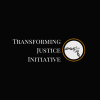

Law Review's 2020 Symposium
- Home
- School of Law
- Academics
- Law Review's 2020 Symposium
Commemorating the 100th Anniversary of the 19th Amendment
Click here to view the symposium.
Made possible by the generous support of:
David Wollmuth and Wollmuth Maher & Deutsch LLP

Friday, October 23, 2020 | 10 a.m. EST
WebEx
This fall, St. John’s Law Review will bring together a group of legal scholars to explore the past, present, and future of women’s rights in the United States during our 2020 symposium Commemorating the 100th Anniversary of the 19th Amendment.
Women have always played a vital role in shaping the cultural landscape of America by persistently demanding equality and opportunity. In 1920, the first women exercised their newly secured constitutional right to participate in our democracy, 244 years after this country’s founding. For most non-white women, however, the fight for voting rights continued for decades. For some, the fight is ongoing.
Now, 100 years later, immense progress has been made. The current landscape would be unrecognizable to the suffragettes of the early 20th century. Gender equality, however, is still far from a reality. This symposium will explore the state of gender equality in America, what we can learn from the past 100 years, and what the next 100 years should look like.
Agenda:
10:00 a.m. – 10:20 a.m. | Introductory Remarks
10:20 a.m. – 11:30 a.m. | Panel I
11:30 a.m. – 11:35 a.m. | Screen break
11:35 a.m. – 12:25 p.m. | Keynote Address
12:25 p.m. – 1:30 p.m. | Panel II
1:30 p.m. – 1:35 p.m. | Farewell Remarks
Panel One
Alissa Gomez, Panelist
Clinical Assistant Professor, University of Houston Law Center
Kit Johnson, Panelist
Professor of Law, The University of Oklahoma College of Law
Cassandra Jones Havard, Panelist
Professor of Law, University of Baltimore School of Law
Rosemary Salomone, Moderator
Kenneth Wang Professor of Law, St. John’s University School of Law
Keynote Address:
Commemorating the Forgotten Intersection of the
Fifteenth and Nineteenth Amendments
Taunya Banks, Keynote Speaker
Jacob A. France Professor of Equality Jurisprudence, University of Maryland School of Law
Cheryl L. Wade, Presenter
Harold F. McNiece Professor of Law, St. John's University School of Law
Panel Two
Nora Demleitner, Panelist
Roy L. Steinheimer, Jr. Professor of Law, Washington and Lee University School of Law
Mikah K. Thompson, Panelist
Associate Professor of Law, University of Missouri-Kansas City School of Law
Nicole Ligon, Panelist
Supervising Attorney and Lecturing Fellow, Duke Law School
Catherine Duryea, Moderator
Assistant Professor of Law, St. John’s University School of Law

Prior to joining the Law Center faculty in 2017, Professor Gomez served for six years as the Executive Director of Houston Volunteer Lawyers, the largest pro bono legal aid provider in Texas and recipient of the State Bar’s Pro Bono Award in 2014. Under her leadership, Houston Volunteer Lawyers achieved a pro bono case placement rate of 98 percent, grew to a full-time staff of 30 including 14 staff attorneys, and launched innovative programming such as the Texas Children’s Medical-Legal Partnership.
From 2002 to 2011, Professor Gomez was a commercial litigation associate and then partner in the Houston office of King & Spalding LLP. She was the first woman associate elected partner from within the Houston office of King & Spalding, and Texas Monthly named her a “Rising Star” for five consecutive years. In 2017, the Houston Association of Women Attorneys honored Professor Gomez with its Premier Women in Law award.
Professor Gomez received her juris doctorate from the University of Texas School of Law in 2002, graduating with Honors as a Chancellor and Order of the Coif. She received her B.A. from the University of Texas in 1998, graduating with Highest Honors and Phi Beta Kappa. Professor Gomez’s research focuses on pro bono and civil justice reform.
At the symposium, Professor Gomez will present her work, The Mismeasure of Success, which explores why a change in perspective at large law firms may be necessary to prevent the continued exodus of women.
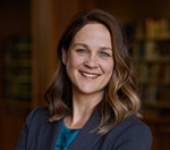
Prior to teaching, Professor Johnson was an attorney with the Los Angeles law firm of Munger, Tolles & Olson LLP, where she practiced general commercial litigation. Professor Johnson also provided pro bono representation in several adoption and guardianship proceedings before the Los Angeles county courts. In addition, she served on the Board of Directors of Inner Circle Foster Care and Adoption Services, a non-profit agency in California's San Fernando Valley.
Professor Johnson earned her juris doctorate from the University of California Berkeley School of Law in 2000 and a B.A. from Wesleyan University in 1997. She served as a law clerk to the Honorable Robert C. Broomfield of the United States District Court for the District of Arizona and, thereafter, the Honorable Pamela A. Rymer of the United States Court of Appeals for the Ninth Circuit.
Professor Johnson teaches Immigration, Crimmigration, and Civil Procedure at the University of Oklahoma College of Law. Her scholarship focuses on immigration law.
At the symposium, Professor Johnson will present her work, Rising Up Without Pushing Down: Lessons Learned from the Suffragettes’ Anti-Immigrant Rhetoric, which cautions against the temptation to raise the status of some women by blaming the “other”, a strategy employed by advocates of the Nineteenth Amendment.

Professor Jones Havard is an expert in financial services regulation, teaching courses in banking regulation, venture capital financing, corporate, and commercial law. A graduate of Bennett College with highest honors, she earned her juris doctorate at the University of Pennsylvania School of Law, where she was Editor-in-Chief of the Black law Journal. After law school, Professor Jones Havard clerked for the late Honorable A. Leon Higginbotham on the U. S. Court of Appeals for the Third Circuit and held various attorney positions involving complex business litigation including at the Department of Justice and the Federal Deposit Insurance Corporation.
At the University of Baltimore, Professor Jones Havard is Director of the Charles Hamilton Houston Scholars Program, a pipeline program for undergraduates who are members of under-represented groups in the legal profession.
Previously, Professor Jones Havard served as a Co-Chair of the Mid-Atlantic People of Color Scholarship Conference from 2009 – 2014 and as a member of the Baltimore Financial Inclusion Working Group in 2015. She is the recipient of the Saul Ewing Transactional Teaching Award in 2016 and named a 2018 Maryland Top 100 Women. Professor Jones Havard’s research interests focus on the nexus between financial products, consumer welfare and systemic risk, analyzed through the lens of law, economics, and race.
At the symposium, Professor Jones Havard will present her work, Structural Intersectionality and the Economic Rights of Women, which argues that remedial reforms addressing the economic insecurity of women of color must be qualitatively different than those for white women.

Professor Rosemary Salomone, the Kenneth Wang Professor of Law, teaches Constitutional Law, Administrative Law, and seminars on Comparative Equality and Anti-Discrimination Law, and Children and the Law.
Prior to St. John's, Professor Salomone was an Associate Professor at the Harvard Graduate School of Education where she taught education law, school finance, and language policy and was a lecturer in Harvard's Institute for Educational Management. She is a former member of the Board of Trustees of the State University of New York where she served for ten years.
She has lectured internationally and published extensively on education law and policy and children's rights from a comparative perspective and has served as a legal consultant or expert witness in cases covering elementary, secondary, and higher education. She is the author of Equal; Education Under Law (St. Martin’s Press), Visions of Schooling (Yale University Press), Same, Different, Equal (Yale University Press), and True American (Harvard University Press). Her most recent book on global English, linguistic justice, and national identity will be published by Oxford University Press.
Professor Salomone is a graduate of Columbia University (Ph.D., LL.M., M.Phil.), Brooklyn Law School (J.D.), Hunter College (M.A.), and Brooklyn College (B.A.).

After receiving her Bachelor of Arts from Bates College and her juris doctorate from Yale Law School, Professor Demleitner clerked for the Honorable Samuel A. Alito, then in the U.S. Court of Appeals for the Third Circuit. She subsequently earned her LL.M. from Georgetown University in international and comparative law before teaching at several law schools across the country.
Professor Demleitner is currently the Roy L. Steinheimer Jr Professor of Law at Washington and Lee University School of Law in Virginia. She teaches, lectures and has published over 60 articles on criminal, comparative and immigration law and legal education. She also teaches women’s and children’s human rights. She is the lead author of Sentencing Law and Policy (Wolters Kluwer/Aspen Law & Business), which is now in its fourth edition.
Professor Demleitner is an editor of the Federal Sentencing Reporter and served on the executive editorial board of the American Journal of Comparative Law. She is an elected member of the American Law Institute, the European Law Institute, the International Academy of Comparative Law, and a Fellow of the American Bar Foundation. She is also a member of the board of the Prison Policy Initiative and the Collateral Consequences Resource Center.
At the symposium, Professor Demleitner will present her work, Sex Work or Prostitution – Time to Reassess Repressive and Punitive Policies Against Women, which discusses how the decriminalization and legalization of sex work could provide needed protections, improve public health, and prevent the secondary stigmatization of women through a criminal record.
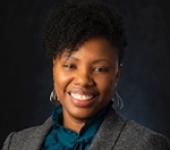
Professor Thompson teaches Civil Procedure I, Evidence, Race and the Law, and Employment Law. Her research centers on the intersection of evidentiary law, criminal law, and critical race theory. She also writes on the pedagogy of legal education with a particular emphasis on techniques for infusing cultural competence into the first-year law school curriculum. Professor Thompson’s forthcoming article, Just Another Fast Girl: Exploring Slavery’s Continued Impact on the Loss of Black Girlhood, explores the connection between slavery-era perceptions of Black sexuality and the modern-day treatment of Black girls who come forward with reports of sexual violence. She has also published articles on the cultural meanings of silence, advocating for a revocation of the tacit admission rule.
Prior to joining the faculty, Professor Thompson was the Director of Affirmative Action and Title IX Coordinator for the UMKC campus. In that role, she coordinated the university’s response to internal complaints of discrimination, harassment, and gender-based violence. She also handled the university’s response to complaints of discrimination investigated by local, state and federal administrative agencies and served as the campus ADA Accommodations Coordinator.
Professor Thompson earned her Bachelor of Science degree in communications from Missouri State University and her juris doctorate from Washington University.
At the symposium, Professor Thompson will present her work, Sexual Exploitation and the Adultified Black Girl, which asserts that implicit racial biases have resulted in a two-tiered system of protection that essentially decriminalizes the statutory rape of Black girls.

Professor Ligon is the Supervising Attorney of the First Amendment Clinic and a Lecturing Fellow at Duke Law School where she teaches First Amendment Law in a clinical setting as well as Entertainment Law and Media Law. She is an active member of the Legal Network for Gender Equity, where she advises individuals seeking guidance on speaking openly and publicly about their stories of sexual assault and sexual harassment while shielding against defamation concerns. Professor Ligon regularly discusses similar topics in the media and has published articles related to similar issues.
Before joining Duke Law, Ligon was an attorney with Cahill Gordon & Reindel in New York City. She was a member of the firm’s litigation department, and her practice focused on First Amendment and media law matters. Her extensive pro bono practice included handling matters on issues related to reporter’s privilege, defamation, right of access, and other free speech concerns.
Ligon received her J.D. from Duke University School of Law and her B.A. from Emory University. When she is not advising clients, writing, or teaching, Ligon supervises students in the First Amendment Clinic on their work litigating active defamation and other First Amendment cases in federal and state courts.
At the symposium, Professor Ligon will present her work, Protecting Women’s Voices: Preventing Retaliatory Defamation Claims in the #MeToo Context, which will offer guidance to both women who wish to speak up about their experiences and attorneys interested in helping them do so in a less risky manner.
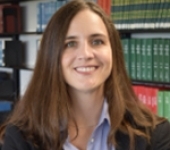
Professor Duryea joined the Law School in 2019, teaching administrative law and legal history. She comes from Stanford University where she earned her J.D. and is completing her Ph.D. in History. Her dissertation, “Practicing Human Rights in the Arab World: International Law in 20th Century Advocacy” explores the significance of early Arab human rights NGOs to the debate over universality, the question of whether human rights are compatible with Islam, and the relationship between human rights and social movements. She also holds an M.A. in Middle East Studies from the American University in Cairo and a B.A. with honors in Political Science from Stanford.
She is a legal historian who researches human rights, comparative constitutional development, and administrative law and has authored two book chapters on Arab human rights movements. After law school, Professor Duryea clerked for the Honorable Edwin Cameron of the Constitutional Court of South Africa. Prior to coming to St. John’s, she was the Charles W. McCurdy Fellow in Legal History at UVA Law and a Fulbright-Hays scholar in Morocco and Kuwait.

Taunya Lovell Banks is the Jacob A. France Professor of Equality Jurisprudence at the University of Maryland School of Law where she teaches torts, and seminars on law in popular culture, citizenship, and critical race theory. Professor Banks earned her B.A. from Syracuse University and her juris doctorate from Howard University.
Prior to entering legal education in 1976, she worked as a civil rights lawyer in Mississippi, litigating voting rights and housing discrimination cases and providing technical assistance to Black elected officials. From 1979 to 1980 she worked as a senior trial attorney for the Equal Employment Opportunity Commission in Los Angeles, litigating some of the early sexual harassment cases under the interim guidelines.
Professor Banks' most recent publications explore the continuing impact of gender, race, racial formation, and racial hierarchies on the quest for social equality. She also writes about law, lawyers, and legal issues in film and on television. Earlier publications include several articles and book chapters on legal and public health issues facing women infected with HIV and an empirical study of gender bias in law school classrooms. She is a contributing co-editor of SCREENING JUSTICE – THE CINEMA OF LAW: FILMS OF LAW, ORDER, AND SOCIAL JUSTICE.
Professor Banks served on the Editorial Board of the JOURNAL OF LEGAL EDUCATION and the advisory committee of the LAW & SOCIETY REVIEW. She is a former member of the Association of American Law Schools’ Executive Committee, and two-term Trustee of the Law School Admissions Council.
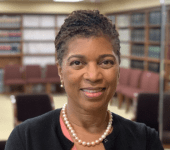
Professor Wade, the Dean Harold F. McNiece Professor of Law, teaches Issues of Race, Gender and Law, Business Organizations, Corporate Governance and Accountability, and Race and Business. Her book, "Predatory Lending and The Destruction of the African American Dream” was published by Cambridge University Press in July 2020 and was coauthored with Dr. Janis Sarra. She is a member of the American Law Institute, a national organization of prominent judges, lawyers and academics who work to clarify, modernize and reform the law. Prior to joining the faculty at St. John's, Professor Wade served on the faculty at Hofstra Law School and was a corporate associate at the law firm, Paul, Weiss, Rifkind, Wharton & Garrison.




